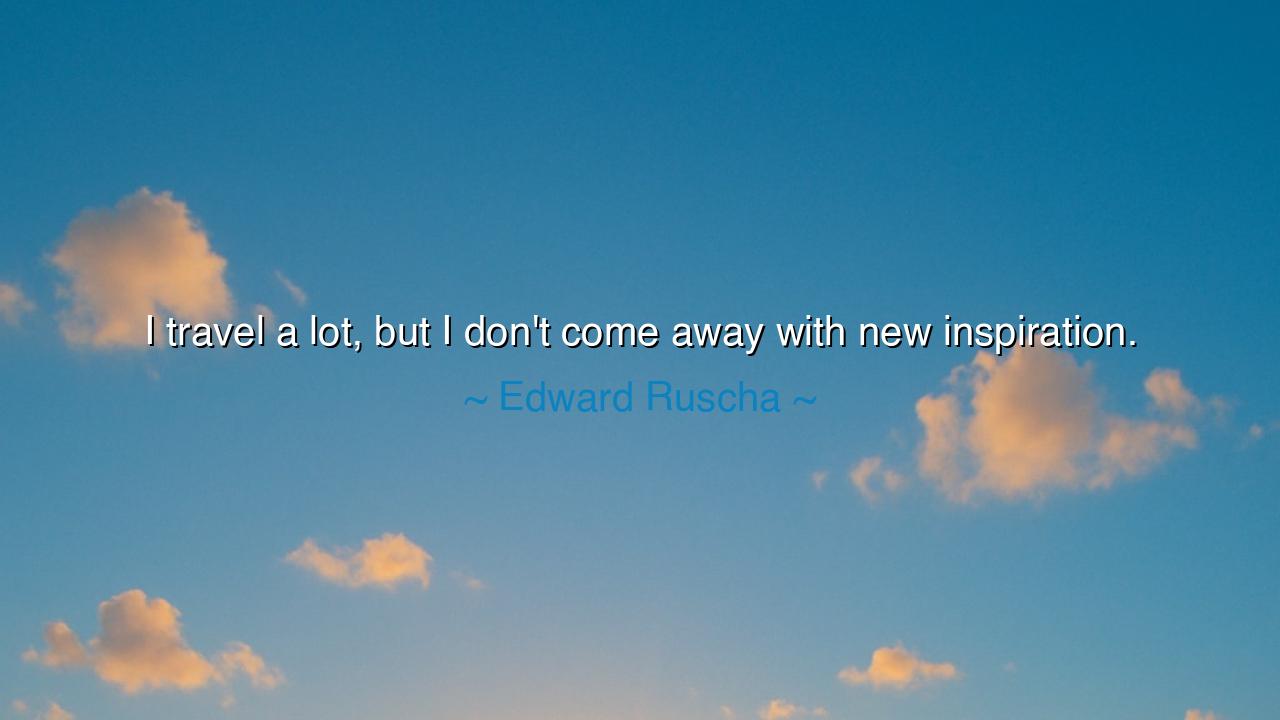
I travel a lot, but I don't come away with new inspiration.






Hear the stark and honest words of Edward Ruscha, artist of the modern eye, who declared: “I travel a lot, but I don’t come away with new inspiration.” These words, though simple in form, carry the weight of revelation. For they strike against the assumption that movement alone brings renewal, that distance alone guarantees vision. Ruscha reminds us that true inspiration does not dwell in foreign lands, nor in crowded itineraries, but in the stillness of perception and the depth of how one sees.
To say, “I travel a lot,” is to admit that the body has moved through many places. Yet to confess, “I don’t come away with new inspiration,” is to reveal that the soul does not always follow. We believe that new lands, new skies, and new people will transform us. But Ruscha teaches us that without inner openness, travel is only motion, and distance only numbers. The eye that does not truly see will find nothing new, whether standing in its home or in the heart of a foreign land.
The origin of his words lies in the life of the artist himself. Ruscha, though exposed to the wide landscapes of America and the great cities of the world, often drew inspiration not from the exotic, but from the ordinary: gas stations, words painted on buildings, the stark lines of highways. For him, grandeur was not found by leaving but by looking. He reminds us that the extraordinary often hides within the ordinary, and that inspiration is less a matter of where one travels than of how deeply one perceives.
History offers testimony to this truth. Consider Emily Dickinson, who rarely left her home in Amherst. To many, her world would have seemed unbearably small. Yet within the confines of her garden and her desk, she discovered infinite universes. Her poems reached heights of vision without the need for distant voyages. She, like Ruscha, shows us that inspiration is not born from the breadth of one’s travels, but from the depth of one’s seeing.
The emotional power of Ruscha’s words lies in their challenge. They shake us awake from the dream that external change alone will heal our weariness or spark our genius. How often do we return from journeys with photographs and souvenirs, yet with souls unchanged? Ruscha’s honesty is a warning: if you seek to escape yourself through travel, you will find yourself again upon arrival. For the mind you carry is the truest companion of every voyage.
The lesson, then, is radiant: do not seek inspiration by fleeing outward alone, but by turning inward, by sharpening the lens through which you see the world. Travel, yes, but do not rely upon the journey to give you what your own heart has not prepared to receive. Inspiration comes not from the distance traveled but from the depth of wonder carried. The world can only reveal as much beauty as the eyes are willing to notice.
Practical wisdom follows: wherever you are, practice seeing. Take note of the small, the overlooked—the shadow of a tree across pavement, the laughter of a stranger, the silence between heartbeats. Carry a journal, not to record distant lands only, but to awaken to the wonders of the ordinary. Then, when you do travel, you will not ask the land to inspire you, but you will already carry inspiration as a living flame within.
So let Ruscha’s words endure as a paradox of wisdom: “I travel a lot, but I don’t come away with new inspiration.” For the message is clear: inspiration is not a gift given by geography, but a discipline of the soul. Whether you walk the streets of Rome or sit at your own doorstep, the power to be inspired is the same—if only you learn to see. And once you learn, every place, near or far, becomes a temple of vision.






AAdministratorAdministrator
Welcome, honored guests. Please leave a comment, we will respond soon